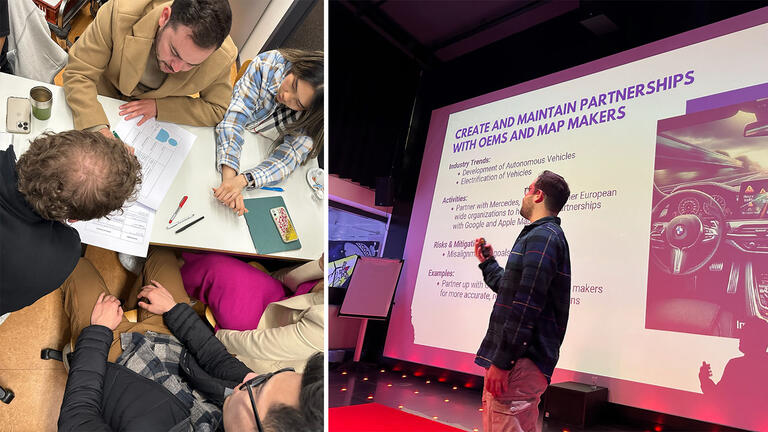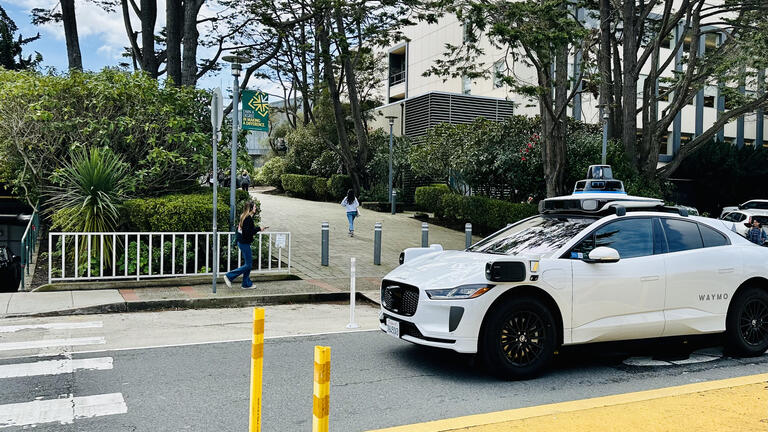

Autonomous Vehicles and the City Initiative
Current & Past Projects
Autonomous Vehicle Street Design: Pick-Up, Drop-Off, and Curb Strategy
Our initiative develops urban design and civil engineering strategies for future streets, emphasizing livability and human-scale design. We create tools and templates with policies for roadway design, curbside infrastructure, and parking removal. Collaborating with UC Davis & Waymo, we focus on operational and curb management to enhance efficiency and reduce empty vehicle miles traveled (VMT). We integrate design with business models, optimizing parking spots and rest areas for AVs to improve operational efficiency. Additionally, we evaluate service clusters to align with public transit and match activity and demand effectively.
Participation and Advising on International Automated Mobility Strategy
Our lab develops strategies for global organizations focused on future automation and digital transformation. Collaborating with Rijkswaterstaat and North Holland Province in the Netherlands, we assess the feasibility of autonomous services and explore AI and blockchain-based digitization of roadways. We advise and participate in EU-funded CCAM projects such as SHOW, FAME, ULTIMO, and Diversify-CCAM, contributing expertise to the European CCAM Outlook (2023). In Diversify-CCAM, we lead the advisory board, guiding critical milestones and decisions, and aiding in project evaluation and implementation. The project aims to develop methods and tools supporting CCAM developers, transportation planners, and policymakers at European, national, and regional levels in integrating social diversities into future shared autonomous mobility across Europe.
-
- Autonomous Mobility Strategy for North Holland Province
- European CCAM Outlook (2023)
- Knowledge Base on Connected and Automated Driving, VIP interview
- Automated Mobility: The People Behind the Wheel, Episode 11

Past Projects
USF + Cruise Research Rider Pilot Program
In 2022 University of San Francisco (USF) Autonomous Vehicles & the City Initiative launched a pilot ride program with Cruise to better understand how AV service could fill transportation needs for USF students. The goal of the program was to create a partnership between industry and academia (students, faculty and staff) to help address lingering transportation policy challenges in the cities. As part of the pilot, Cruise provided students rides in their initial operational design domain during off-peak / late night hours when transit served students least and USF researchers. The findings Results indicate that more than 76% of reported travel by AV riders was mode substitution, largely diverting from rideshare and transit. Over 55% of trips replaced rideshare travel—most of these trips were for social/recreational and shopping/errands. These results suggest that most AV trips may not create induced or latent demand but rather provide an opportunity to address network gaps and last mile connectivity.
Read Paper on Pilot Autonomous Vehicle Rider Program Watch Presentation on Trip Patterns & Experiences in Autonomous Vehicles
Autonomous Vehicles and Disabled Access
In 2021 a team from USF and Cal Poly, San Luis OBispo evaluated how autonomous vehicle (AV) technology could help disabled Americans achieve their desired level of mobility, and reviewed literature and standards on how the technology can accommodate users at different stages of trip making through information system design, vehicle design, and infrastructure design. The research found that many emerging on-demand autonomous services have the potential both meet and exceed relevant Americans with Disabilities Act (ADA) standards in the US. It suggested that that vehicle design might evolve to better meet standards in the areas of 1) Voice Controlled Systems and 2) Pick Up/Drop Off Point Orientation, and that universal design principles and assistive technologies could maximize accessibility in future accessible autonomous vehicle deployments.